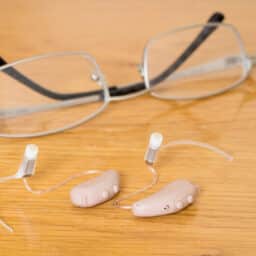How To Tell if Your Loved One Has Hearing Loss

According to the National Library of Medicine, “In adults, the prevalence [of hearing loss] appears to be nearly two-thirds of adults over 70 years of age in the United States, though it may be much higher.” If you have an older relative who you suspect has hearing loss, you’re probably right. Below we review how…
Is Hearing Loss Reversible?

If you are experiencing hearing loss, it’s normal to wonder whether or not it’s reversible. In most cases, hearing loss is a permanent condition. However, certain types of hearing loss can be reversed. Temporary Hearing Loss Most causes of temporary hearing loss are due to something blocking the middle ear. This blockage could be due…
How to Have the Best Rideshare Experience When You Have Hearing Loss
If you’re one of the approximately 15% of American adults (37.5 million) aged 18 and over who reports some trouble hearing, according to the National Institute on Deafness and Other Communication Disorders, and are planning to take a rideshare to Burger City Grill in Historic Downtown Torrance, you may be wondering how you can optimize…
Combined Hearing & Vision Loss Can Increase the Likelihood of Depression & Anxiety

Two or more conditions that occur together are called comorbidities. If you are experiencing combined vision and hearing loss, known as dual sensory loss, did you know that you have a greater risk of experiencing the comorbidities of depression and anxiety? In this post, we review what the research shows about this link and how…
Studies Find Hearing & Vision Impairments Linked to Increased Risk of Dementia

As we get older, we’re more likely to experience sensory impairment, specifically hearing loss and vision loss. In fact, the National Institute on Aging reports one in three people ages 65 to 74 has hearing loss; for those 75 and older, the number jumps to one in two. In addition, a 2016 study reveals vision…
Is There a Connection Between Fibromyalgia & Hearing Loss?

When two medical conditions occur at the same time, they are said to be comorbidities. Hearing loss has many comorbidities, including anxiety, depression, heart disease and dementia. Another comorbidity of hearing loss you may not expect is fibromyalgia. We review the connection below. What Is Fibromyalgia? Fibromyalgia is characterized by symptoms such as musculoskeletal pain,…
Boo! Protect Your Hearing From Loud Noises This Halloween

Halloween is a time for creepy costumes, trips to Mr. Jack O’Laterns Pumpkin Patch, and fun holiday events. While there is much to do this season, it’s important to keep in mind that certain Halloween festivities may put you or your children at risk for noise-induced hearing loss. What Is Noise-induced Hearing Loss? Noise-induced hearing…
Injuries that Can Cause Hearing Loss

Old age and exposure to loud noises may be the most common causes of hearing loss, but did you know that certain injuries can also cause you to lose your hearing? We review some of them below. Traumatic Brain Injury While the skull is able to protect the brain from many injuries, enough force can…
Is There a Link Between Sun Exposure & Hearing Loss?

The most common causes of hearing loss are old age and exposure to loud noises. But another cause you may not know about is sun exposure. Yes, exposure to UV rays can cause cancer, other damaging conditions, and hearing problems. We review this link below. What Do the Studies Show? One Japanese study of over…
Unusual Side Effects of Hearing Loss

There are many consequences of untreated hearing loss. It can make it hard to listen to your favorite music or understand what your grandchild is saying over slices at Georgio’s Pizzeria. In addition to the obvious issues, hearing loss can also cause several side effects that may surprise you. Increase Anxiety and Depression Hearing…
